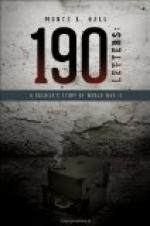I should like to be able to admire with you this lovely cloud, this stretch of country which so fills us with reverence, to listen with you to the poetry of the wind from beyond the mountain, as when we walked together at Boulogne. But here a great many prosaic occupations prevent me from speaking to you as I feel.
I sent you with my baggage my note-book from August 18 to October 20.[2] These notes were made when we could easily get at our light bags, in the calm of our trench-days, when our danger stopped our chattering, and I could let my heart speak. I found a happiness more intense, wider and fuller, to write to you about. That was a time of paradise for me. But I don’t like the billets, because the comfort and the security, relaxing our minds, bring about a great deal of uproar which I don’t like. You know how much I have always needed quiet and solitude. Still, I have excellent friends, and the officers are very kind.
But with a little patience and a few thoughts about you I can be happy. How kind this first half of November has been! I have not suffered once from cold. And how lovely it was! That All Saints’ Day was nothing but a long hymn—from the night, with its pure moonlight on the dark amber of the autumn trees, to the tender twilight. The immense rosy dream of this misty plain, stretching out towards the near hills. . . . What a song of praise! and many days since then have sung the glory of God. Coeli ennarrant. . . .
That is what those days brought to me.
[Footnote 2: Part of this note-book has already been given.]
November 15, 7 o’clock.
Yesterday the wild weather, fine to see from the shelter of our billet, brought me apprehensions for to-night’s departure, but when I woke the sky was the purest and starriest that one could dream of! How grateful I felt!
What we fear most is the rain, which penetrates through everything when we are without fire or shelter. The cold is nothing—we are armed against it beforehand.
. . . In spite of all, how much I appreciated the sight of this vast plain upon which we descended, lashed by the great wind. Above the low horizon was the wide grey sky in which, here and there, pale rents recalled the vanished blue.—A black, tragic Calvary in silhouette—then some skeleton trees! What a place! This is where I can think of you, and of my beloved music. To-day I have the atmosphere that I want.
. . . I should like to define the form of my conviction of better things in the near future, resulting from this war. These events prepare the way to a new life: that of the United States of Europe.




